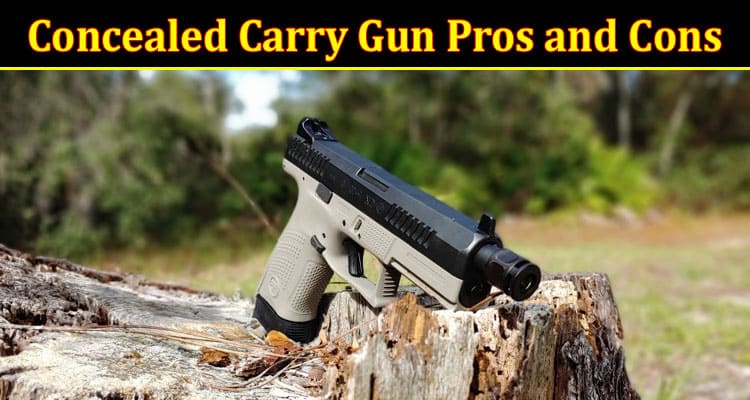The ownership of a firearm is a subject that ignites spirited discussions regarding personal defense and athletic activities. A good revolver is one choice that frequently comes up in these discussions. Thanks to their long history and reputation, we associate revolvers with dependability and ease of use.
Let’s discuss the advantages and disadvantages of having a firearm.
The Pros of Gun Ownership
Listed below are some advantages of gun ownership:
1. Personal Protection and Safety
Owning a firearm can provide you peace of mind, one of the key reasons for ownership. It’s crucial to defend oneself and loved ones. When faced with a potentially life-threatening scenario, having access to a firearm can help you and your loved ones feel more secure. A gun can be your first line of defense in a home invasion or robbery.
A legal concealed weapon permit makes you a better observer and more aware of your surroundings. When you’re more aware of possible dangers, you’re better able to spot them and deal with them in a way that keeps you safe.
2. Recreational Shooting Activities
You do not need to own a firearm to participate in exciting sports like target or skeet shooting. It’s not only entertaining, but it’s also a terrific method to hone your shooting skills. Furthermore, participating in shooting contests lets you test your skills against other shooters.
Aside from competitive shooting, a gun allows you to participate in hunting and enjoy the outdoors alone or with family and friends.
Shooting also gives you a sense of calm and focus that you have to feel to understand. The calm and focus result from your body producing adrenaline, acting as a stress reliever for most people.
3. Gun Collectibles
Collecting is another possible outcome of gun ownership. Firearms are an excellent long-term investment if you are genuinely interested in them. You can make a profit on firearms by buying and selling them. A weapon can retain or gain value over time if cared for properly. Gun enthusiasts not only like to collect guns, but they also enjoy using 80 lowers for custom builds.
The Cons of Gun Ownership
Here are some of the most common disadvantages of gun ownership:
1. Risk of Misuse
The major drawback of owning a gun is its misuse. Even if you are a careful gun owner, there is always the risk of harm or death from an unintentional discharge. Neither criminals nor innocent bystanders are safe from the reach of a gun. Individuals are four times more likely to accidentally use guns than they are to use them in homes for self-defense.
2. Safety and Legal Issues
Guns are also notoriously hard to keep safe, which can lead to theft and abuse. The penalty for possessing a firearm subsequently used in a crime is high, even for the owner.
You risk becoming a victim of a domestic shooting or suicide if you keep guns at home. This is true regardless of the number of firearms, the storage methods, or the sort of firearm.
3. High Cost of Maintenance
Owning a gun also carries a hefty price tag. The initial outlay for firearms and ammunition is high. Further training and legal representation expenses are a requirement. Gun ownership comes with responsibilities and risks, as with any other privilege or right.
The Psychological Aspect of Guns
Psychological perspectives on underlying emotions, motivated reasoning, and individual differences help us to understand US gun attitudes and control. These include:
Fear
Fear drives “anti-gun” and “pro-gun” beliefs. Thus, we should not dismiss gun owners’ anxieties as illogical. Gun owners and non-gun owners fear victimization to varying degrees.
Fear influences risk assessment and decision-making, especially for low-frequency catastrophic occurrences like mass shootings.
Negative gun attitudes may overestimate hazards, whereas positive attitudes may reduce them.
Motivated Thinking
Motivated thinking fuels discussions over whether specific gun regulations reduce gun violence.
Gun control laws affect gun owners’ worries about self-defense.
Gun restrictions may increase terror among gun owners. Law-abiding gun owners are unlikely to embrace policies that ignore their concerns while ignoring criminal access.
Individual Variance
Gun ownership psychology depends on individual attitudes, beliefs, values, and experiences that shape firearm perceptions and emotions.
Personal history, cultural background, exposure to violence, and institutional trust affect one’s psychological attitude toward gun ownership.
Some feel empowered, secure, and self-reliant, while others feel anxious, fearful, or uncomfortable.
We should address the psychological effects of gun ownership by adapting education, training, and support to encourage responsible and safe firearm usage.
Find The Best Concealed Carry Handgun
The issue of gun regulation is a complicated one, and supporters of both sides of the case have compelling reasons. Ultimately, whether an individual believes that the benefits of gun ownership exceed the drawbacks is solely up to that person.
It is crucial to complete your homework and be aware of the risks involved with gun ownership if you consider purchasing a firearm. In addition, you need to ensure that your firearm stays in a secure location and that you know how to use it responsibly.

